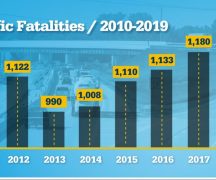Most Ohio’s colleges and universities say they will not require students to receive the COVID-19 vaccine to return to campus next fall.
All the largest institutions in the state — Ohio State University, the University of Cincinnati, Ohio University and others — said via spokespeople they have no plans to require students and employees to take the vaccine.
Just two Ohio universities to date have announced plans to require the vaccine to some extent: Cleveland State University and Kenyon College, a small liberal arts school in Knox County.
Six institutions — Case Western Reserve University, Denison University, University of Dayton, Xavier University, Bowling Green State University and Wright State University — indicated they’re still weighing it over.
Colleges already require students to show proof of a host of vaccines. For instance, OSU requires students take the Hepatitis B, Polio, Varicella and three other immunizations before enrolling.
The Food and Drug Administration granted an emergency use authorization for the three available COVID-19 vaccines as opposed to full approval, given the dire nature of the pandemic.
While the COVID-19 vaccines underwent clinical trials with tens of thousands of participants and are under ongoing federal scrutiny, the emergency-use status muddles calculations on requirements. Similarly, vaccine requirements and proof of vaccination has fallen into a polarized political morass that universities may seek to avoid.
The Association of Independent Colleges and Universities of Ohio, which represents dozens of smaller colleges, declined an interview request.
Here’s how schools responded when asked what their plans are.
Yes
CSU cited the increasing availability of vaccines in its decision. It will require vaccinations for all students living on campus.
“We will be doing our best to ensure that every member of our university community is vaccinated,” said university president Harlan Sands. “Now that the vaccine is available to everyone over the age of 16 in Ohio, we’re encouraging our students, faculty and staff to take advantage of the fantastic mass vaccination center at our Wolstein arena or another site that’s convenient.”
In a letter to students, Kenyon College President Sean Decatur said vaccines protect individuals from serious infection and possibly asymptomatic infection and transmission.
“Requests for reasonable accommodations for sincerely held religious beliefs and medical exceptions will be considered on an individual basis, but it is our expectation that an overwhelming majority of students will be vaccinated,” he said.
No
OSU, by far the state’s largest university, said it will not require the vaccine but is encouraging students to take it. UC and Oberlin College made similar statements.
Some schools said they have no plans to require the vaccine “at this time,” possibly leaving the door open in the coming months. These include the University of Toledo and Miami University, in Oxford.
OU spokeswoman Carly Leatherwood says there are no plans for a mandate in Athens.
“With the vaccine being under an Emergency Use Authorization (EUA), most universities and workplaces are not requiring vaccine,” she said. “We are working hard to encourage everyone – students, faculty, and staff to get vaccine as soon as possible.”
Maybe
Some schools are still hashing out a plan.
“We have not as yet set our expectations about vaccinations for students and employees for next year, but continue to strongly encourage students, faculty and staff to be vaccinated,” said Cilla Shindell, a spokeswoman for the University of Dayton.
Xavier hasn’t yet made its decision, said spokesman Doug Ruschman. However, he said the college estimates about 50% of students have already received the vaccine.
BGSU hasn’t yet made its decision, according to chief university health officer Ben Batey.
“As we look toward the future, BGSU continually strives to be as flexible as possible during the pandemic,” he said in a statement. “The university understands that every one of our community members has a different viewpoint on these topics, and BGSU continually strives to be as flexible as possible regarding the pandemic. The university understands that every one of our community members has a different viewpoint on these topics, and BGSU has worked to be supportive of each individual. If BGSU would decide to mandate the vaccine because of high case numbers and recommendations from state public health officials to do so, the university would also have an exemption process for students.”
Wright State, Denison, and Case Western Reserve also said in statements they’re still figuring out their policy.
Communications staff for Kent State University and the University of Akron did not respond to inquiries.
***
Also from Ohio Capital Journal:
The NFL is asking for vaccine proof at Ohio event, but the governor won’t recommend other businesses to do likewise
When the NFL draft opens in Cleveland on Thursday, people will have to show proof that they’ve been fully vaccinated to be in most rooms where the action is taking place and to attend part of the fan event.
Also, the league is requiring team employees who are medically eligible to get vaccinated or lose access to players and key facilities.
Ohio Gov. Mike DeWine on Tuesday acknowledged that with about a third of the state fully vaccinated, demand for the coronavirus is slackening. But he wouldn’t encourage other sports leagues and entertainment venues to follow the NFL’s lead and require proof of vaccination to attend events.
“It’s a private business,” DeWine said. “I don’t think the governor or state government should get involved in telling a pro-anything team that they should have an area for the vaccinated or the un-vaccinated, or require you to be vaccinated to come. That’s not my decision to make.” READ MORE
Bill would let Ohio health orders expire without legislative approval
In about two months, Ohio lawmakers will gain the power to strike down public health orders they disagree with through a majority vote.
Some Republican legislators are continuing to seek other ways to curtail the authority of the state health department. A new bill proposes to let health orders expire without lawmakers having to necessarily take a vote to rescind them.
Rep. Kris Jordan, R-Ostrander, introduced House Bill 267 last week with the initial support of five GOP cosponsors.
The bill would limit health orders issued to prevent the spread of infectious diseases to being in effect for up to 14 days. After two weeks, an order would expire unless the Ohio General Assembly voted to extend it. The Ohio General Assembly would have the power to continuously extend an order for intervals of up to 14 days. READ MORE





